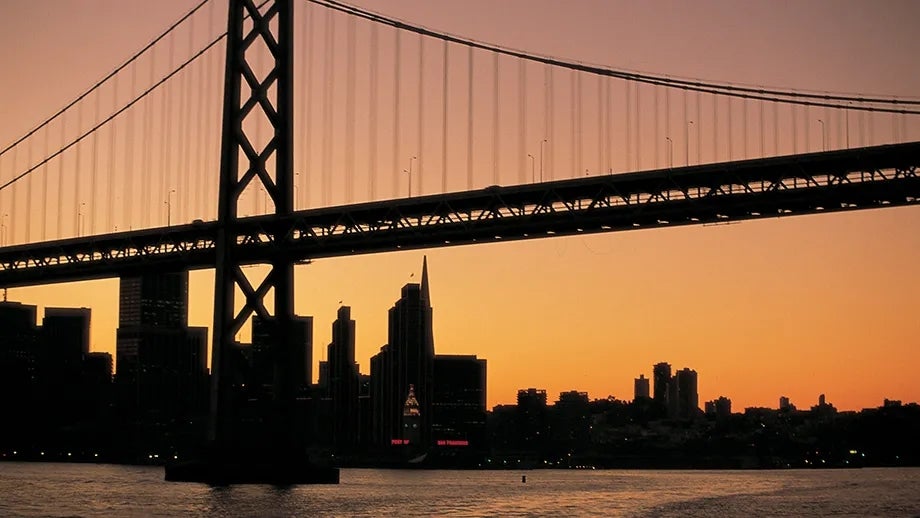Bay Bridge Forward
Bay Bridge Forward is a set of investments and strategies to improve efficiency, reduce delays and move more people and buses across the most-traveled bridge in the Bay Area.
The San Francisco-Oakland Bay Bridge (Bay Bridge) corridor is a vital lifeline for commuter and business travel to and from the City of San Francisco and the East Bay. It is consistently ranked the most congested corridor in the region. Severe traffic congestion occurs on the approaches to the bridge, especially in the morning commute hours. Vehicles spend more hours delayed approaching the Bay Bridge than on all the other Bay Area east-west crossings combined. At times, this congestion prevents high-occupancy vehicles (HOVs) and buses from accessing the existing by-pass lanes at the toll plaza – and is worse than the congestion on the bridge itself. At the same time, high rates of people driving alone and lower transit ridership means that more than half of the seats in vehicles crossing the Bay Bridge are empty.
The Bay Bridge Forward Program proposes solutions that would increase the number of people moving through the area by filling empty seats. This would improve operations and reduce congestion without hefty capital investments. Bay Bridge Forward includes a suite of projects to: improve transit travel time and reliability; promote carpooling and transit ridership; increase the number of people who can move through the corridor (person throughput); and reducing greenhouse gas emissions.
See an expanded version of the Bay Bridge Forward program projects map. Project details are below.
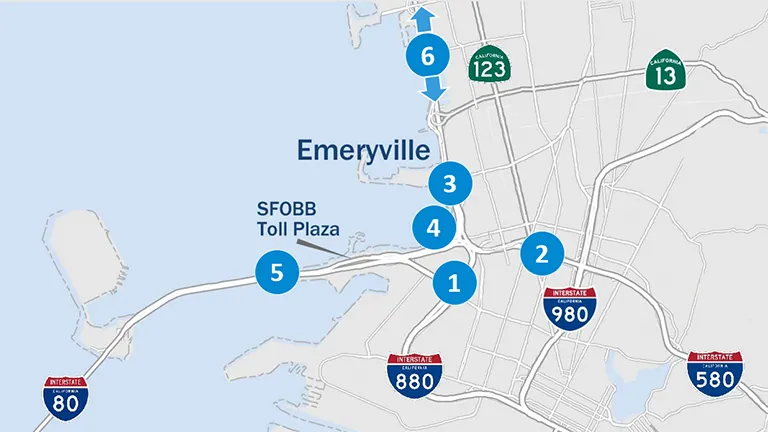
Bay Bridge Forward Program Projects
Project 1: West Grand Avenue Bus and High Occupancy Vehicle Lane
In 2016, MTC, in partnership with Caltrans and the City of Oakland, proposed the construction of a dedicated bus and carpool lane on West Grand Avenue to improve the travel time for buses and carpoolers approaching the Bay Bridge toll plaza from West Grand Avenue. The project is separated into two phases.
Phase 1
In 2019, the first phase was constructed, which created an HOV lane on the Interstate 80 (I-80) West Grand Avenue on-ramp by converting approximately 1,300 feet of right shoulder into a bus/HOV lane. The bus/HOV lane is open to buses 24 hours a day, seven days a week. HOVs with three or more occupants are allowed to use the lane during weekday peak hours, 5 a.m. to 10 a.m. and 3 p.m. to 7 p.m. The new HOV lane has provided substantial travel time savings for buses and HOVs to bypass congestion during the morning peak period.
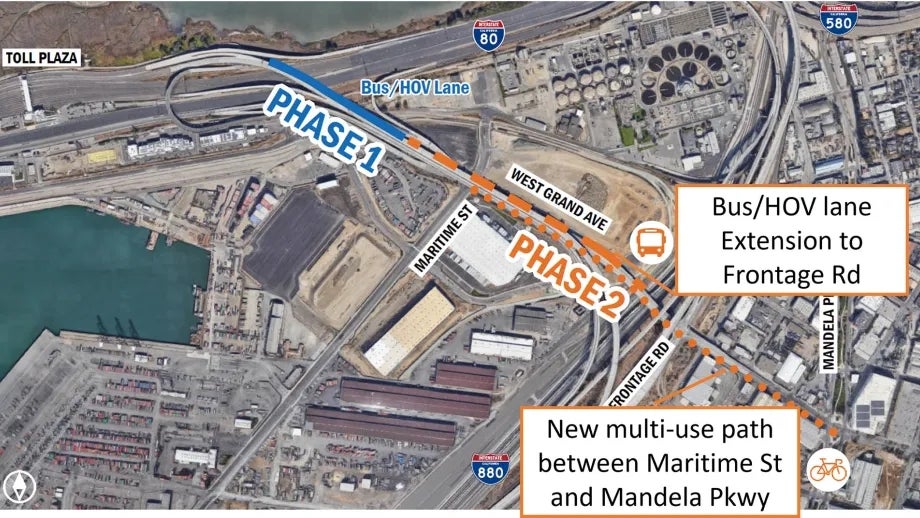
Phase 2
Development of phase two is currently underway. It will extend the existing bus/HOV lane from its current limit to the beginning of the West Grand Avenue on-ramp at the Maritime Street intersection. A new full-time bus-only lane will also be constructed between Maritime Street and Frontage Road to allow buses to bypass a major queue on West Grand Avenue. The new bus-only lane will be open to HOVs with three or more occupants during the weekday peak hours (5 a.m. to 10 a.m. and 3 p.m. to 7 p.m.).
Phase two of the project also proposes to construct a class I multi-use path on the south side of West Grand Avenue as part of phase two to close a 0.7-mile gap in the existing West Oakland bicycle network. The multi-use path will provide a key connection to the existing class I multi-use path on Maritime Street to the west and class II bike lanes on Mandela Parkway to the east of the project area.
Phase two construction is expected to begin in 2024. When completed, the project will bring additional benefits for carpools, buses, pedestrians and bicyclists.
Project 1 Schedule
| Project Milestone | Estimated Completion Date |
|---|---|
| Phase 1 Construction | 2019 |
| Phase 2 Preliminary Engineering & Environmental Studies | Summer 2023 |
| Phase 2 Final Design | Spring 2024 |
| Phase 2 Construction | Winter 2025 |
Staff Contact
Cathy Chea
Phone: 415-778-6774
Email: cchea@bayareametro.gov
Project 2: Interstate 580 Westbound HOV Lane Extension
The Interstate 580 (I-580) westbound corridor serves as an approach to the Bay Bridge and is a key transbay commute corridor connecting the East Bay to San Francisco. The corridor experiences heavy traffic congestion during morning peak hours, with traffic backing up to the Interstate 980 (I-980)/State Route 24 (SR-24) interchange.
MTC, in partnership with Alameda CTC, proposes to extend the existing HOV lane on I-580 westbound to the area by the I-980/SR-24 interchange as a near-term improvement.
The I-580 Westbound HOV Lane Extension Project seeks to:
- Increase person throughput during peak hours.
- Improve travel time reliability to support buses and HOVs.
- Encourage mode shift by providing travel time savings for HOV and transit users.
The project proposes to convert a westbound general-purpose lane to an HOV lane from just east of the I-980/SR-24 interchange to connect with the existing /HOV lane at the toll plaza approach (just west of the MacArthur maze), a distance of approximately 1.7 miles.
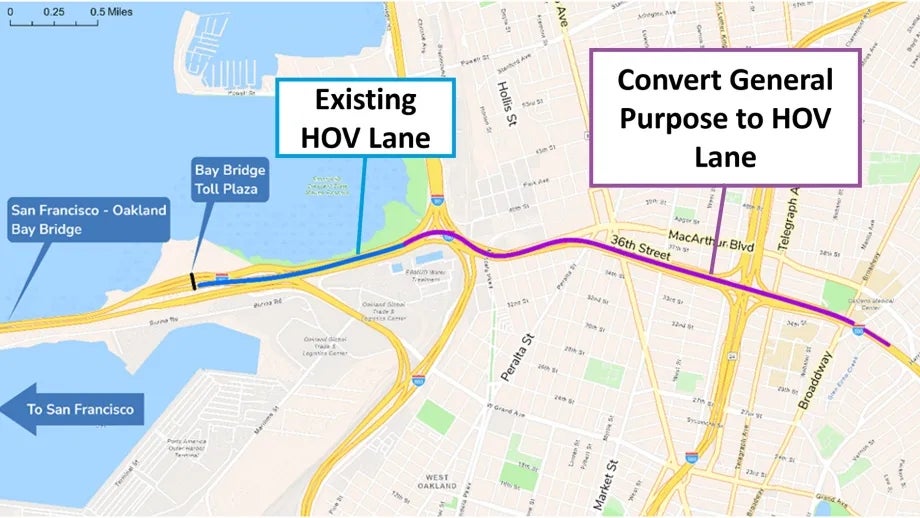
Project 2 Schedule
| Project Milestone | Estimated Completion Date |
|---|---|
| Preliminary Engineering & Environmental Studies | Spring 2024 |
| Final Design | Summer 2024 |
| Construction | Summer 2025 |
Staff Contact
Pamela Kwan
Phone: 415-778-5378
Email: pkwan@bayareametro.gov
Project 3: Interstate 80/Powell Street Interchange Transit Access Improvements
The Interstate 80 (I-80)/Powell interchange currently services multiple transbay bus routes including Alameda-Contra Costa Transit District (AC Transit) lines and the Capital Corridor (Amtrak) connecting bus between Emeryville Station and San Francisco. The existing transit route on West Frontage Road and I-80 Powell Street loop on-ramp are highly congested during morning peak commute hours. The project is needed to address the transit operational deficiencies that currently result in travel delays and decreased reliability for transit vehicles that enter and exit I-80 through Powell Street.
MTC, in partnership with Alameda CTC, the City of Emeryville and AC Transit, is proposing transit facility improvements within the I-80 Powell Street interchange to:
- Improve transit reliability and travel time.
- Improve transit accessibility.
- Promote safety for transit riders.
- Encourage transit use.
The improvements include the construction of a dedicated transit lane on Powell Street; new bus stops with improved pedestrian and bicycle access; and dedicated transit-only signals and detectors at the ramp intersections to facilitate transit priority.
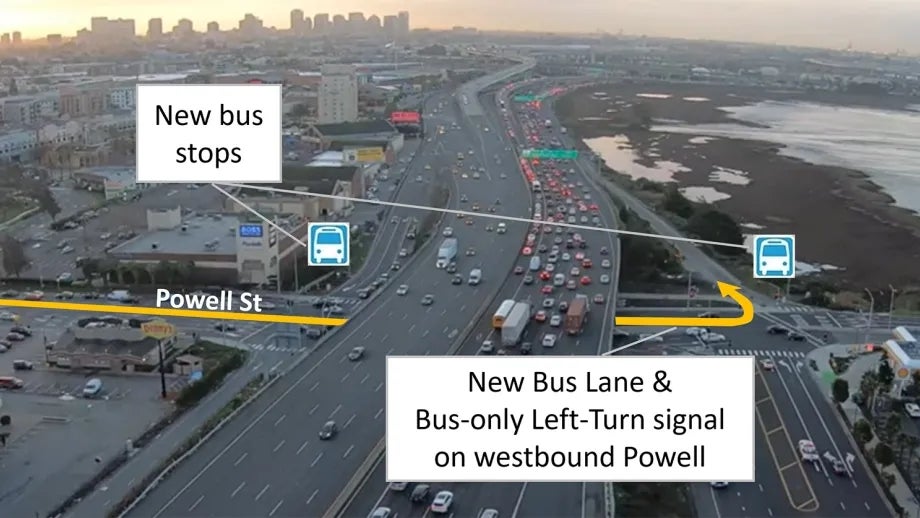
Project 3 Schedule
| Project Milestone | Estimated Completion Date |
|---|---|
| Preliminary Engineering & Environmental Studies | Winter 2022 |
| Final Design | Summer 2023 |
| Construction | Summer 2024 |
Staff Contact
Pamela Kwan
Phone: 415-778-5378
Email: pkwan@bayareametro.gov
Project 4: Interstate 80 Westbound HOV/Bus Lane
The Interstate 80 (I-80) westbound HOV lane and the HOV connector ramp (also known as the I-80 flyover ramp) serves HOV traffic on the I-80 corridor. The I-80 flyover ramp provides a direct connection to the Bay Bridge toll plaza, allowing buses and HOVs to bypass a major bottleneck north of the I-80/I-880/I-580 junction. Heavy traffic congestion in the vicinity of the I-80 Powell Street interchange can prevent buses and HOVs from accessing the I-80 flyover ramp.
MTC, in partnership with Alameda County Transportation Commission, proposes adding an HOV lane to the outside of westbound I-80 between Powell Street Interchange and the Bay Bridge toll plaza. This project will benefit transit vehicles entering from the Powell Street interchange, as well as other HOVs traveling on westbound I-80 that cannot use the existing leftmost HOV lane facility due to congestion. The I-80 westbound HOV/bus lane project seeks to:
- Improve the operational efficiency and travel time for buses and HOVs on westbound I-80.
- Increase person throughput.
- Encourage carpooling and transit use.
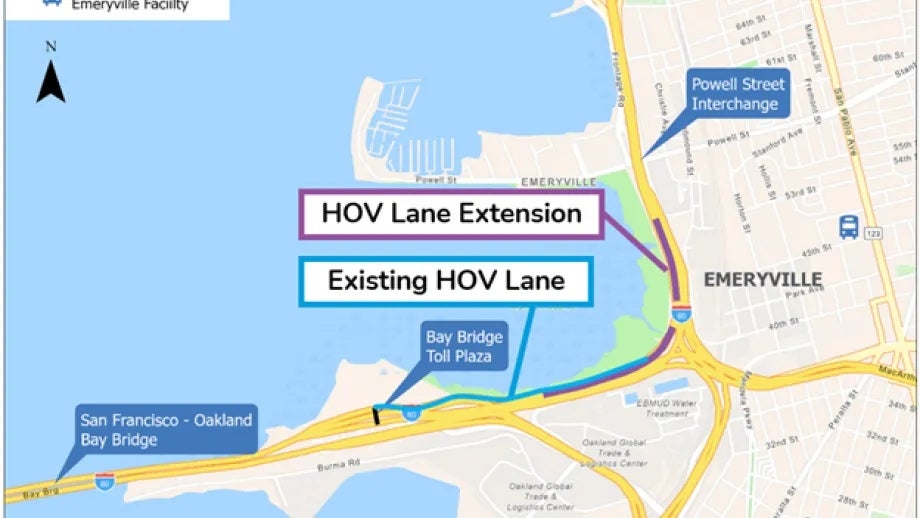
Project 4 Schedule
| Project Milestone | Estimated Completion Date |
|---|---|
| Preliminary Engineering & Environmental Studies | Winter 2024 |
| Final Design | Spring 2025 |
| Construction | Spring 2026 |
Staff Contact
Pamela Kwan
Phone: 415-778-5378
Email: pkwan@bayareametro.gov
Project 5: Smart Transbay Transit
The Smart Transbay Transit project aims to deliver near-term Intelligent Transportation Systems (ITS) enhancements.
MTC is currently collaborating with Alameda County Transportation Commission, Contra Costa Transportation Authority, AC Transit and WestCat on the first phase of the project.
The goals of the first phase are to: assess current transbay bus operations; analyze strategies to improve transbay bus service; and to define preferred corridors and concepts for project development.
Project 5 Schedule
| Project Milestone | Estimated Completion Date |
|---|---|
| Planning and Analysis | Fall 2024 |
| Design | 2025 |
| Implementation | 2026 |
Staff Contact
Henry Hammel
Phone: 415-778-6718
Email: hhammel@bayareametro.gov
Project 6: Interstate 80 Design Alternative Assessment (DAA) & Related Projects
In August 2023, MTC completed the Interstate 80 (I-80) Design Alternative Assessment (DAA) to address traffic congestion for the I-80 corridor in Alameda and Contra Costa counties between the Carquinez Bridge and the San Francisco-Oakland Bay Bridge.
The assessment recommended four operational strategies to advance through to the first phase of the project delivery pipeline. Expand the tabs for projects 6a through 6d for more details.
Project Map
View the Interstate 80 Design Alternative Assessment (DAA) & Related Projects map.
Project 6a: Interstate 80 HOV Lane Hours of Operation
MTC, Caltrans, the Alameda County Transportation Commission and Contra Costa County Transportation Authority are evaluating extending the hours of operation of the HOV lanes along the Interstate 80 corridor between the Bay Bridge and the Carquinez Bridge and at the approaches to both bridges. The HOV lanes are currently restricted to vehicles with 3 occupants or more on weekdays between 5 a.m. and 10 a.m. and between 3 p.m. and 7 p.m. The analysis and implementation will evaluate expanding the hours to include midday and weekend operations. This project will reduce delays to HOVs and buses outside of peak hours, and encourage higher-capacity modes of travel.
Project 6a Schedule
| Project Milestone | Estimated Completion Date |
|---|---|
| Analysis and Approvals | 2024-2025 |
| Final Design | 2025-2026 |
| Construction | 2026-2027 |
Staff Contact
Britt Tanner
Phone: 415-778-4414
Email: btanner@bayareametro.gov
Project 6b: Interstate 80 HOV Lane Access Restrictions
MTC, Caltrans, the Alameda County Transportation Commission (ACTC) and Contra Costa County Transportation Authority (CCTA) propose to implement access restrictions along the existing HOV lanes on the Interstate 80 corridor between the San Francisco Oakland Bay Bridge and the Carquinez Bridge. Access restrictions will improve the operations of the HOV lane and improve safety.
Currently, the HOV lane is separated from general traffic by a dashed line, which indicates that it is OK to enter and exit the HOV lane at any point. The project proposes to designate stretches of the HOV lane either open (similar to today) or restricted. The restricted sections would be marked with double white lines to indicate it is illegal to enter and exit the lane, improving the operations of both the HOV and general traffic lanes and improving safety by reducing conflicts between merging vehicles.
Project 6b Schedule
| Project Milestone | Estimated Completion Date |
|---|---|
| Planning and Analysis | 2024-2025 |
| Environmental Review & Design | 2026 |
| Construction | 2027-2028 |
Staff Contact
Britt Tanner
Phone: 415-778-4414
Email: btanner@bayareametro.gov
Project 6c: Interstate 80 Localized Transit Priority / HOV Strategies
The Interstate 80 Localized Transit Priority / HOV Strategies project will evaluate eight on-ramps to identify the highest-priority and most-beneficial treatments to improve transit and/or carpooling, including Ramp/Transit Access Improvements, Transit Signal Priority, Bus Stop Improvements and HOV Bypass Lanes.
Project Map
View the Interstate 80 Localized Transit Priority project map.
Project 6c Schedule
| Project Milestone | Estimated Completion Date |
|---|---|
| Preliminary Analysis | Summer 2024 |
| Project Initiation Document (PID) | Spring 2025 |
| Project Approval/ Environmental Document (PA/ED) | Winter 2026 |
| Final Design | Fall 2026 |
| Construction | Summer 2027 |
Staff Contact
Cathy Chea
Phone: 415-778-6774
Email: cchea@bayareametro.gov
Project 6d: Interstate 80 Bus-on-Shoulder Feasibility Study
Bus-on-Shoulder projects allow buses to travel on the shoulder of the highway during congested periods, when the mainline freeway speeds are under 35 mph. This treatment frees buses from the worst congestion and improve travel times and reliability. The Interstate 80 Bus-on-Shoulder Feasibility Study will assess the feasibility of pursuing Bus-on-Shoulder on I-80, and identify potential segments to move into conceptual design.
Project 6d Schedule
| Project Milestone | Estimated Completion Date |
|---|---|
| Feasibility Study | Summer 2025 |
Staff Contact
Britt Tanner
Phone: 415-778-4414
Email: btanner@bayareametro.gov
Other Operational & Demand Management Strategies
The following projects have been completed or are already underway:
- MTC SHIFT program: Working with employers, the MTC SHIFT program provides grants that support programs to reduce the number of people who drive alone.
- Bryant Street on-ramp: Piloted various enforcement methods to reduce HOV violations.
- Flexible on-demand transit: Provided on-demand transit services from the East Bay to job centers outside of downtown San Francisco that are not well-served by transit.
- Higher capacity/increased express bus service: Retrofitted buses and increased frequencies on impacted AC Transit transbay routes. Added double-decker buses on the most productive AC Transit and WestCAT transbay express bus routes.
- Higher frequency ferry service: Increased service frequencies on the Alameda, Oakland and Vallejo ferry routes.
- Integrated bridge corridor: Improving mainline metering on the westbound Bay Bridge approach.
- Transit signal priority: Gave buses priority at traffic signals on the West Grand Avenue approach to the Bay Bridge.

